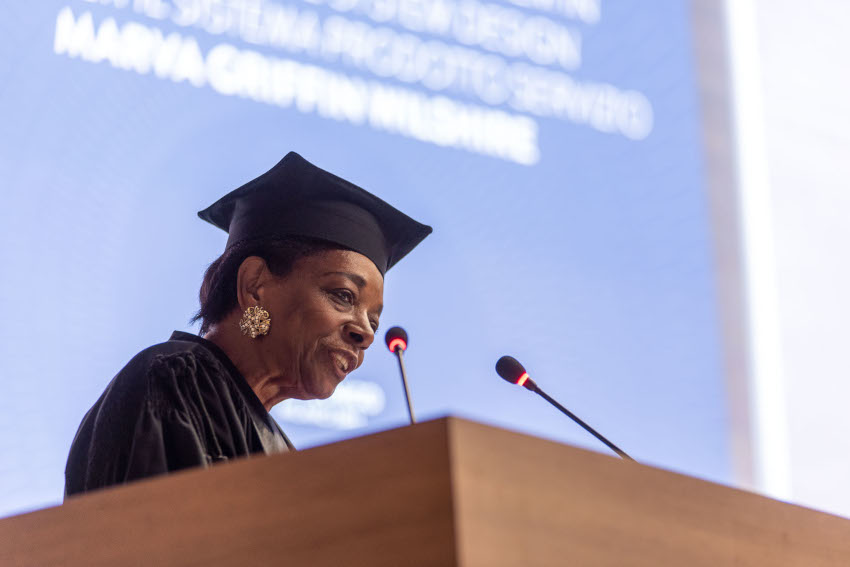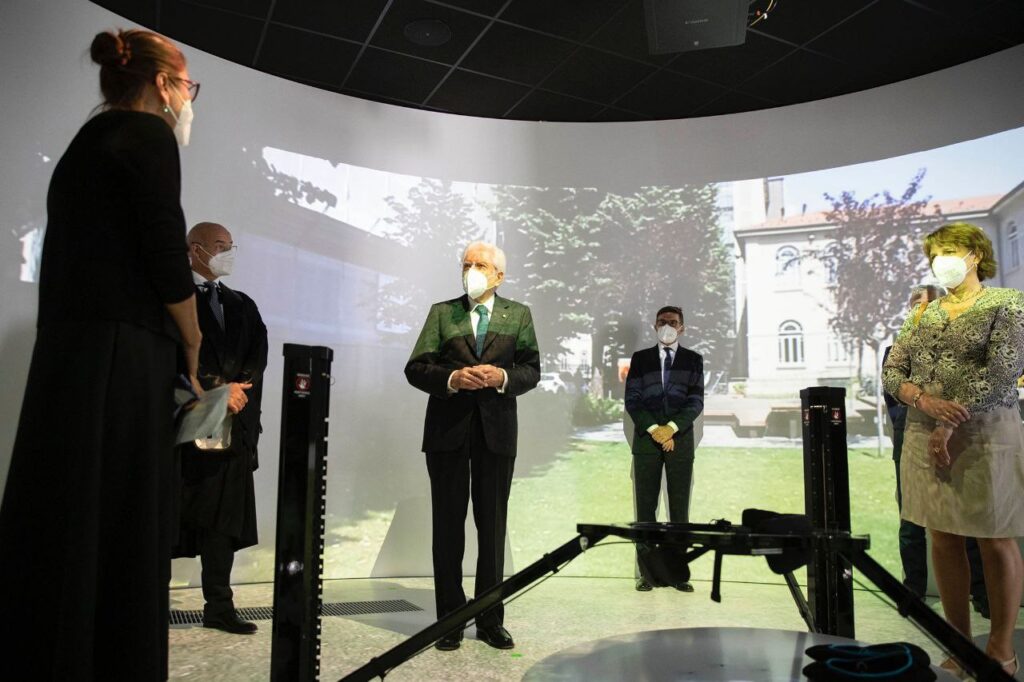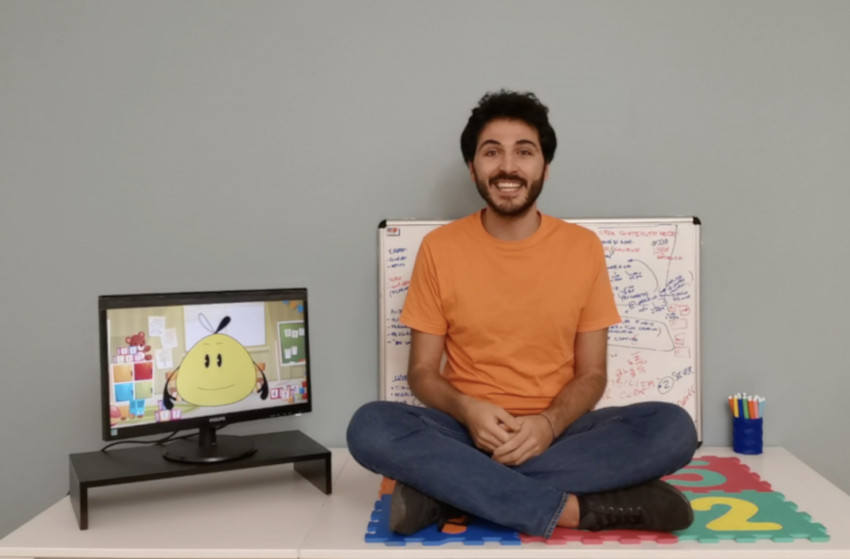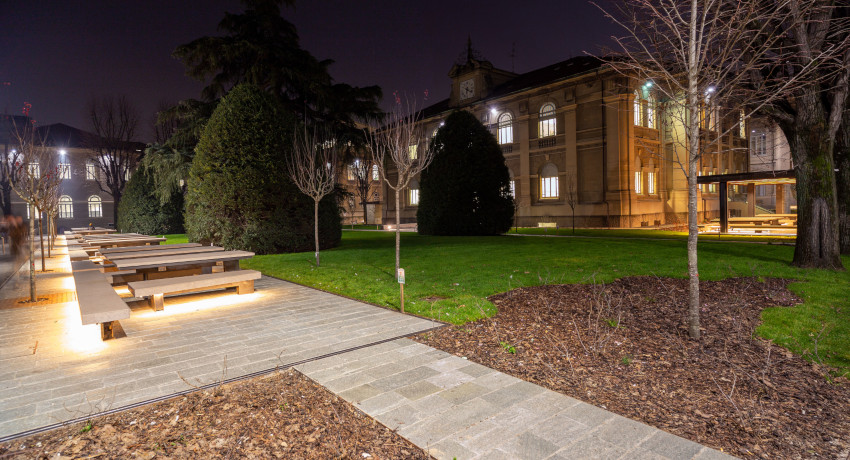In the athletes that made us proud during the recent Paralympic Games, there is a part of us: three students from Politecnico di Milano. As we watched them rejoice, we could not help but ask ourselves: is the actual value of the medal found in that metal disc? Or is that perhaps only the tangible symbol of the many years of training which led to that moment? Last Sunday, looking at that disruptive yellow river winding through the streets of Milan that were the runners finally back to run the Polimirun Spring, the answer seemed even clearer.
Often we tend to see only the result, the accomplishment. And that’s enough for us. But in this moment of recovery, we should make an effort to rediscover the value of training. Especially because a new and intense year of research awaits us here at Poli.
Many trainers come into our lives, and we don’t just mean on the athletic field. There’s a very special one named Emoty. This chubby virtual coach and his “father” Fabio are definitely a source of inspiration.
Even Marva Griffin, to whom we recently awarded an honorary Master of Science in Product Service System Design, is a true trainer of talent. In fact, she came up with the SaloneSatellite in order to create a space for young designers.
Training improves us, it helps us to grow. And this is what Paolo Schito has done in his life: his precocious passion for boats brought him to Poli, where he grew professionally. Now he teaches aero-hydrodynamics, and describes his journey to us with the enthusiasm of a sea captain.
In these first days that our campus is reopening, we need this training in order to return to the way we were. In order to envision the future. To be able to design it, we must be visionaries. Or we can ask for help from the cutting-edge tools in the new LaborA laboratory, which shows us the world of the future. Follow us inside.
And speaking of the future: will we be able to leave a sustainable planet for future generations? Circular economy attempts to provide some answers, training us to give more value to products, extending their lifespan and reducing waste. This is the type of future that we like, towards which project like FENIX are projected, turning the useless into beauty and giving value to the used-up.
These are just some of the stories that you can read in Frontiers, stories which suggest that, while the objective is important, the journey that we take to achieve it is even more so. Let’s train ourselves to recognise this.
Frontiers’ encounters: Marva Griffin and her life dedicated to design

“First of all, curiosity. Then you have to choose a school that will adequately prepare you. Finally, read, see, don’t copy, but rather inform yourself about everything that’s happening, stay up-to-date.” These are the characteristics that a good designer should have according to Marva Griffin, who just days ago was awarded an honorary Master of Science in Product Service System Design here at the Engineering University.
We understood that Marva Griffin’s life was destined for design just by listening to her words, in the wonderful and emotional interview which she granted us right before the ceremony. But we could also see it in her eyes, which are still those of a little girl who, in a small Venezuelan town, dreamed of making the world beautiful.
A long journey carried by the wind: what research means to Paolo Schito
When he talks about what research means to him, it almost seems as though he’s describing the characteristics of a good captain: “For me research is curiosity, collaboration, dialogue, severity, and intuition.” That’s how Paolo Schito’s life is: a journey, in which water and wind have always played an important part.
His life began in Venice, and his passion for that sea and for its boats naturally became a topic for research. Today he teaches aero-hydrodynamics for sailing, continuing to explore the effects of water and wind on nautical structures.
Paolo’s journey is far from over, but we were able to stop him for a moment, just long enough for him to tell us about it in a brief captain’s log which we’ve published for you.
Photonews

The President of the Republic Sergio Mattarella visits LaborA, during the inauguration of the new Campus Piano on 22 June. Cecilia Bolognesi takes us to visit the reborn laboratory of physical and virtual models housed in the brand new glass building. A magical place for architects, urban planners and engineers, where the objects of the future take shape before they are born.
Paolo Rosa and the art of transforming a cellular phone into a ring
Sharing, borrowing, reusing, repairing, reconditioning, and recycling pre-existing materials and products are the fundamental principles of circular economy. This is what the future has in store, because our country’s resources are not infinite. But how easy or difficult is it to put an ideal model into practice? This is the challenge of our time.
Among the various roads which engineering researchers have embarked upon regarding this topic, there’s the European H2020 FENIX project. It’s name evokes a powerful image: like a phoenix rising from its own ashes, so too can electronic waste be turned into beautiful objects, like jewellery, in its next life.
Paolo Rosa accompanies us in this reincarnation: beginning with the circuit boards of cellular phones, he is assisted by collaborative robots that are skilled in disassembly, takes advantage of the Internet of Things and cyber-physical systems to connect processes, and uses innovative hydrometallurgical technologies to recycle materials and give them new life, in the form of modern jewellery, thanks to the latest 3D printers.
But we assure you that it’s even more enjoyable to hear about it in Paolo’s own words.
Fabio Catania and his Emoty, the virtual trainer of emotions

In our lives, all of us must every day contend with our emotions. But there are people for whom it is more difficult to recognise and manage them, not only within themselves, but also when interacting with others. It’s estimated that approximately 10% of the population suffers from varying degrees of emotional dysregulation.
There’s a lab at Poli, the I3lab, which studies the applications of interactive technology in the fields of health and education, with particular focus on children with special needs, and on their requirements in terms of social, emotional, and intellectual wellness.
Fabio Catania is a PhD student in Information Technology who has developed conversational technologies and affective computing applications that support treatment of neurodevelopmental disorders which are the focus of his studies. In this interview he tells us about Emoty: the virtual trainer of emotions which helps children to develop better emotional control and better awareness of self, in order to improve their communication skills and their quality of life.

